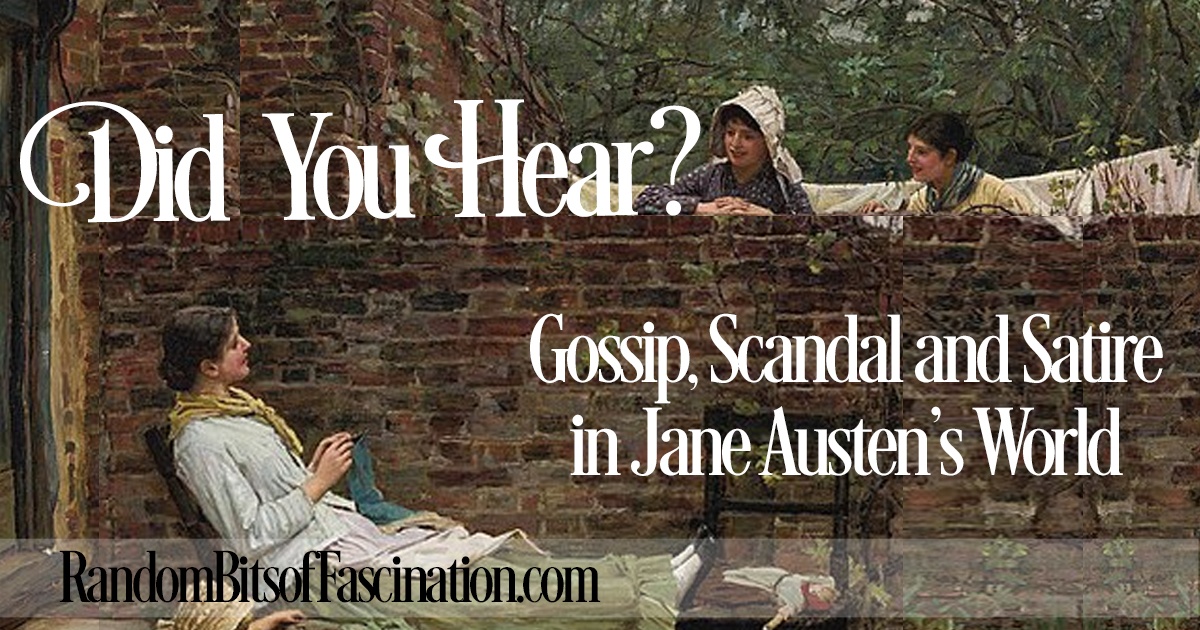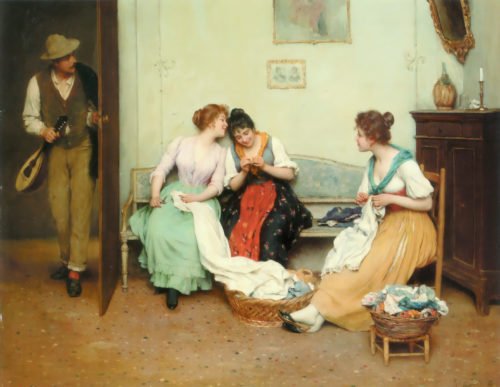Did You Hear” Gossip, Scandal and Satire in Jane Austen’s World

Though etiquette writers cautioned that “scandal and gossip had no place in polite conversation,” let’s be honest, people have always been people. The latest details on persons of interest, the more scandalous the better, has always been what people talk about.
Despite the lack of today’s instant social media, during the Regency era, juicy tidbits rarely stayed private for long.
Gossip starts at Home

Though I hardly think gossip is the purview of one gender over the other, ladies of the Regency were probably considered more likely to gossip than men, considering females minds were often thought only fit for gossip and fashion. (Laudermilk, 1989) (Yeah, I know, but that’s a whole different set of posts…)
The fashion of making morning calls provided an ideal opportunity to share the latest news of mutual acquaintances. Though generally limited to a quarter of an hour, that still was plenty of time to share juicy tidbits. It isn’t difficult to imagine ladies thinking through what they might share as they walked (or in the case of wealthier ladies) rode to their calls. While more substantive conversations surely took place, given that ladies were rarely encouraged to read the newspaper and become aware of serious news, local on-goings were likely to have taken first place in their world and conversations.
In Pride and Prejudice, Austen had Caroline Bingley invite Elizabeth Bennet to ‘take a turn about the room’ after dinner at Netherfield. Indoor strolls of this nature, through a room in a private house, the house itself, or around a large public assembly room during an event were common. They also provided an opportunity for relatively private gossip to be shared.
Outdoor walks through gardens and wildernesses often served a similar purpose, allowing confidences to be shared with less likelihood of being overheard, although in Austen’s Persuasion, Anne Elliot overhears herself being discussed by Louisa Musgrove and Frederick Wentworth. Awkward. Benches and follies where one might sit comfortably in the shade and enjoy the garden also served to encourage conversation, and probably gossip.
On a larger scale, after dinner at a party, a hostess would lead the ladies to withdraw to the drawing room, leaving the men to enjoy port, cigars and ‘masculine’ conversation. Whatever else might transpire in the dining room with the men or the drawing room with the ladies, it is a pretty certain bet that gossip was a large part of that.
Opportunities for Gossip in Public
Gossip was hardly limited to private venues. Any place people might gather could become ‘gossip central.’
Clubs of all sorts were known hotbeds where one could hear the latest salacious tale. Though men’s clubs might have the veneer of more serious pursuits: politics, sports, business deals, farming, there is little doubt that once the alcohol starting flowing, gossip did too. Almack’s, arguably the most prestigious social ‘club,’ “was a temple of insipid propriety: politics, the war, the riots in the streets outside, were all taboo as subjects of permissible conversation. Sex was obviously banned, talk about money was vulgar, and the only permissible conversation seems to have been gossip.” (Murry, 1999)

Public venues offered as much opportunity for gossip as private one. Those who could afford evenings at the theater often went as much for the gossip as for the event itself. Today, we expect audiences to sit in a darkened room, focused on a lit stage, quiet and immersed in the world of the event itself. Regency theater could hardly have been more different. Technology did not readily permit lights to be dimmed. Audiences were loud, sometimes very loud, shouting at one another and even to the players on the stage. (Some theater forms, like pantomime anticipated and encouraged this audience participation.)
During a performance fruit sellers and other venders plied their trades, often loudly. Messages were carried between the audience and vendors, as well as other audience members, by theater staff, messengers and servants. While some of these transactions were of business, including the hiring of Cyprian company for the evening, love notes and gossip were also passed throughout the theater. It is not difficult to imagine gossip-mongers anticipated watching between whom messages were exchanged as well.
Gossip Spreads Far and Wide
Once one acquired a juicy bit of news and shared it with local acquaintances, what was one to do with it? Without telephones, text messages or twitter, letters proliferated the spread of gossip.
Women were expected to be the family correspondents. With menfolk busy at their important efforts, it fell upon ladies to maintain connections between family and friends. After pretty passages had been copied from letter-writing manuals, gossip frequently filled the cross-written lines . Jane Austen’s own letters often contained neighborhood news and her own commentary on such on-goings.
“Anyone living in or visiting London was supposed to send all the latest gossip out to provincial friends and such letters would be lent further round the local community.” (Le Faye, 2002) Similarly, country newspapers would report the doings of local citizens of note. The news would find its way into letters and proliferate through the countryside. Sufficiently scandalous items managed to find their way into the national papers. We’ll have a look at those in the next installment!

I have always pictured Missus Bennet in “Pride and Prejudice” as the ‘Mistress of News’ in her community. She undoubtedly knew everything and repeated it all.
As long as people have a means to communicate, they will gossip. I think that social media makes it more convenient.